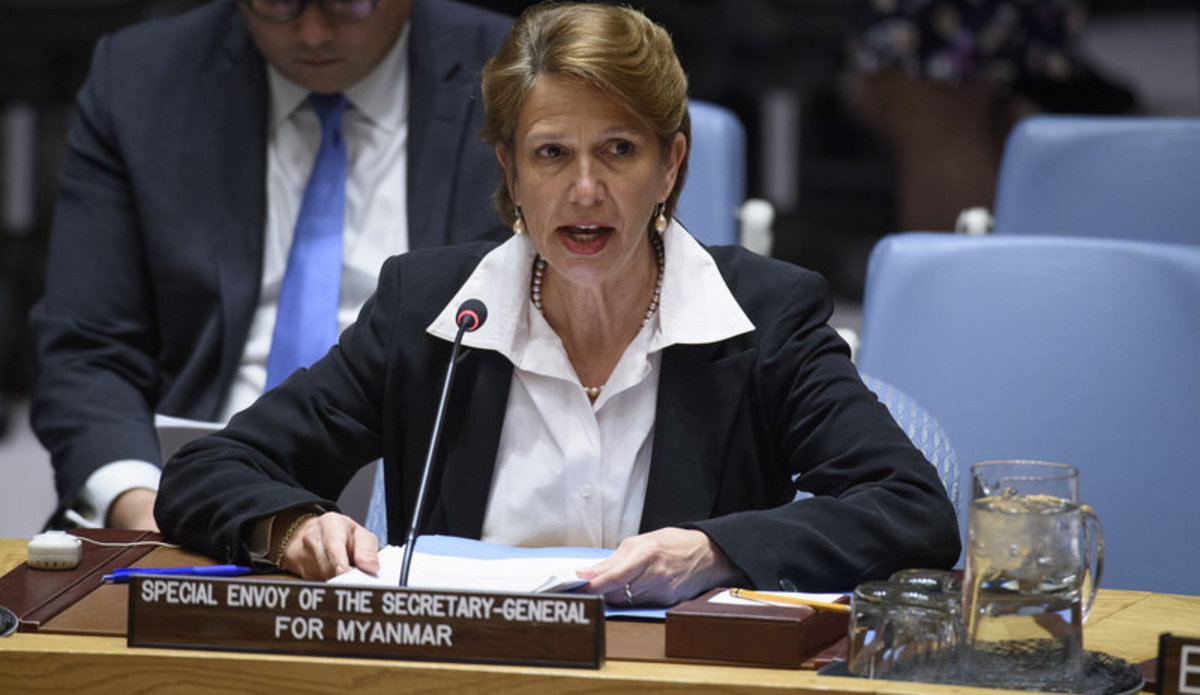Mr. President, Distinguished Delegates:
Since I began this assignment nine months ago, I have visited Myanmar five times, Bangladesh three times as well as other tours in the region and beyond.
18-months have now passed since the recent violence in Rakhine State forced hundreds of thousands of Rohingya and others to flee their homes, including across the border into Bangladesh.
In the broader context of Myanmar’s democratic transition, military and civilian tensions persist ahead of general elections next year and the peace process remains fragile while the country struggles with the legacy of decades of rule by the army and subsequently, fundamental issues relating to the protection of human rights.
Rakhine
In addition to accountability, I have been underlining in my engagements, the following steps that are needed: i) Ending the violence in Rakhine; ii) Unfettered access to affected people; iii) Addressing the root causes and; iv) inclusive and equitable development.
I have witnessed first-hand in my two visits to Cox’s Bazar, refugees living in extremely challenging temporary conditions and with little sign of hope.
While Bangladesh and host communities have been very generous, we cannot expect this to continue indefinitely. The recently launched UN Joint Response Plan for 2019 to benefit both refugees and host communities needs urgent funding.
Meanwhile, I am concerned that the heavy fighting with the Arakan Army (AA) will further impact efforts toward the dignified, voluntary and safe return of refugees.
I have appealed to all sides to ensure the protection of civilians and uphold their responsibilities under International Humanitarian and Human Rights Law.
For refugees in Bangladesh, knowing that the UN and its partners are present at their places of return will be positive incentive to return.
In developing durable solutions for those displaced within Myanmar, it is vital that the current positive efforts by Myanmar to draft a national strategy on the closure of IDP camps address the underlying issues in Rakhine, including the question of citizenship and restoring freedom of movement.
Even prior to the fighting with the AA, the level of access was a problem. Access in the implementation of the MoU between Myanmar and UNDP/UNHCR to support the creation of conditions for the return of the refugees from Bangladesh was insufficient. This must improve to address fragility of all communities in Rakhine.
Any complementarity, especially at the regional level by ASEAN in support of the bilateral efforts between Myanmar and Bangladesh will be crucial.
At the request of both governments, I will continue my shuttle diplomacy and to engage all other regional stakeholders.
I will also continue to encourage Myanmar’s greater international cooperation towards the effective and holistic implementation of all recommendations of the Advisory Commission on Rakhine State.
On related key issues, I am in close contact at the highest levels on steps that authorities are taking with a view to transparent and credible procedures.
In my recent visits to Myanmar, I have advocated for a “Zero Tolerance for Discrimination” campaign from top down.
In addition, I will aim to coordinate and foster greater intercommunal dialogue in Rakhine State through my Office in Nay Pyi Taw.
Accountability
Accountability is essential for combating impunity and genuine reconciliation.
Myanmar’s Independent Commission of Enquiry (ICOE) has responded positively to my recommendation that it should engage with United Nations human rights entities such as with OHCHR and the FFM.
There needs to be complementarity, including with the latest Human Rights Council mandated independent investigative mechanism.
But national responsibility and ownership of accountability are also important, not least from the perspective of the victims in Cox’s Bazar and throughout Myanmar.
In line with the Basic Principles on the Right to Remedy and Reparation for Victims of Gross Violations of Human Rights Law and Serious Violations of International Humanitarian Law, accountability should not be solely seen in terms of criminal liability.
I therefore am encouraging various initiatives that give the victims different kinds of voices and supporting projects that foster dialogue as mentioned above.
Peace Process
We are witnessing in other areas beyond Rakhine, including Kachin and Shan states, setbacks in the complex peace process. In these areas too, many affected civilians require assistance and access there too has been restricted.
Despite some positive steps towards an inclusive and peaceful solution, such as the 21 December unilateral ceasefire declaration by the Tatmadaw, tensions have escalated, including between the government side and signatory groups of the October 2015 Nationwide Ceasefire Agreement (NCA).
It is the responsibility of all parties to exercise restraint and avoid actions that can reverse the important gains of the peace process.
I stand ready to help support this process.
Some refugees from the camps in Thailand recently returned to Myanmar. It will be important to seize on such important confidence-building measures and build momentum.
Concluding Remarks
2020 general elections activities could add to the domestic complexities.
In such an environment, State Counsellor Daw Aung San Suu Kyi is evidently moving ahead carefully on democratic reform, as highlighted by the recent efforts on the constitutional amendment. It will be paramount that reform issues address institutionalised discrimination.
I am grateful that the Government of Myanmar agreed to and facilitated the installation of my small four-staff Nay Pyi Taw Office in January, helping reinforce the constructive cooperation that has been extended to me so far, as reflected in the access I have been able to enjoy.
We must collectively continue to build trust and work in partnership with the Government of Myanmar.
I will continue to speak truth and help build bridges and greater mutual understanding, including in support of the United Nations role in upholding international norms and standards.
This requires confidence-building and regular communication with all leaders. While I do share concern that progress has been slow, my first five visits to Myanmar have highlighted the enormous challenges that will require tremendous international support.
Thank you.

